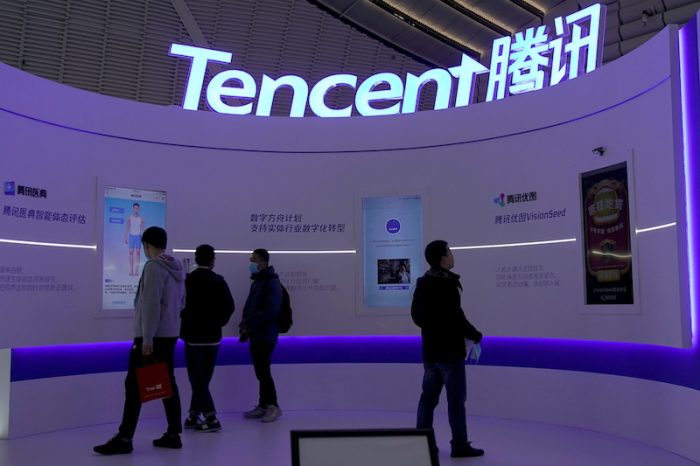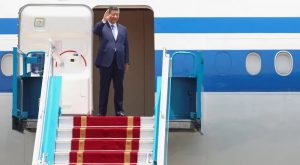Shares of Tencent Holdings plunged by more than 7% on Tuesday after the US Defence Department blacklisted the Chinese tech giant, along with battery-maker CATL and a range of other companies on Monday.
Tencent, the owner of WeChat and many video games, issued a statement that said the listing was “clearly a mistake,” adding: “We are not a military company or supplier. Unlike sanctions or export controls, this listing has no impact on our business.”
Meanwhile, CATL, the world’s electric vehicle battery maker, whose shares fell over 5% on the Shenzhen exchange, also complained that the designation was an error, saying “is not engaged in any military-related activities.”
ALSO SEE: Tesla Begins Making Battery Megapacks in Shanghai
The list also included COSCO Shipping Holdings, the country’s largest shipping company, plus chipmaker Changxin Memory Technologies, Quectel Wireless, drone-maker Autel Robotics, according to a document published on Monday.
Two entities owned by Chinese state-owned oil major China National Offshore Oil Corporation were also listed, CNOOC China Ltd and CNOOC International Trading.
The annually updated list of Chinese military companies, formally mandated under US law as the “Section 1260H list,” designated 134 companies, according to a notice posted to the Federal Register.
The latest decisions are part of the Defence Department’s efforts to counter China’s military-civil fusion strategy.
Warning to US entities
While the designation does not involve immediate bans, it could be a blow to the affected companies’ reputations and represents a stark warning to US entities and firms about the risks of conducting business with them. It could also add pressure on the US Treasury Department to sanction the companies.
The Hong Kong-listed shares of Tencent fell by over 7%, while the US-traded shares of the company, which is the parent of instant messaging app Weixin, or WeChat, were down 8% in over-the-counter trading.
A Quectel spokesperson said the company “does not work with the military in any country and will ask the Pentagon to reconsider its designation, which clearly has been made in error.” Quectel’s shares fell nearly 7%.
COSCO’s HK-listed shares dropped more than 4%.
Chinese foreign ministry spokesman Guo Jiakun denounced the move as an overreach of national security concepts and called for the US to rectify its actions and cease unilateral sanctions against Chinese companies, according to the South China Morning Post.
The Chinese embassy in Washington also opposed the move, which it described as unreasonable suppression of Chinese businesses. It urged the US to correct its “discriminatory practices”, but said China would safeguard the legitimate rights and interests of its firms.
The other companies did not immediately respond to requests for comment.
‘The garden of sensitive technologies is growing’
The updated list is one of numerous actions taken by Washington in recent years to highlight and restrict Chinese companies it says pose security risks, weighing on strained relations between the world’s two biggest economies.
In 2021, the US Defence Department removed Xiaomi after the Chinese tech firm sued the US government for including it on the list. A federal judge had called the US government’s process to include Xiaomi “deeply flawed”.
Morningstar senior equity analyst Ivan Su said he believed Tencent had a good chance to secure exclusion through US courts, like Xiaomi, but that its inclusion could result in reputational damage.
Tencent’s US earnings exposure was in the high-single-digit percentage range, he added, mostly made up of gaming revenue. “While this represents the maximum potential downside, we see it as highly unlikely that Tencent’s US gaming revenue will be affected over the near-term.”
Jefferies said in a research note the purpose of the Chinese Military Companies (CMC) list was to express the opinion of the Defense Department which could serve as a reference for other government departments.
“The most serious consequence for CMC companies is US investment ban, but it’s all up to Trump and his team.”
Craig Singleton, a China expert at the Foundation for Defense of Democracies, said the additions showed that it was “reckless” for American firms to conduct business with a growing swath of Chinese corporations.
“The US isn’t just safeguarding a handful of technologies anymore,” he said. “The garden of sensitive technologies is growing, and the fence protecting them is being fortified.”
Other companies added include MGI Tech, which makes genomic sequencing instruments, and Origincell Technology, which lawmakers have alleged operates a cell bank network and bio-storage technologies. Neither firm immediately responded to requests for comments.
US lawmakers pushed the Pentagon throughout 2024 to add some of the companies, including CATL, to the list.
Ford Motor is building a battery plant in Michigan and plans to license CATL technology to produce low-cost lithium-iron batteries at the facility – a move that has sparked concerns by some lawmakers. Ford did not immediately comment on Monday.
Two previously listed companies, drone maker DJI and Lidar-maker Hesai Technologies, both sued the Pentagon last year over their previous designations, but remain on the updated list.
The Pentagon also removed six companies it said no longer met the requirements for the designation, including AI firm Beijing Megvii Technology, China Railway Construction Corporation Ltd, China State Construction Group Co and China Telecommunications Corporation.
- Reuters with addtional editing by Jim Pollard
NOTE: Further details on the Chinese response were added to this report on January 7, 2024.
ALSO SEE:
US Considering Restrictions, Potential Bans on Chinese Drones
China Ponders Export Curbs on Lithium Tech, EV Batteries
Chinese Hackers Breached US Treasury’s Sanctions Office: Report
Chinese Hackers Stole Treasury Documents, US Officials Say
US Looking to Ban Sales of China’s TP-Link Routers
China is Using AI to Ramp up Espionage, US Says – WSJ
US Sets New Rules to Block China, Rivals’ Access to US Data
China Testing Bigger Cargo Drones And Helicopter Taxis
More Chinese Companies Blacklisted For Uyghur Forced Labour
Italian Officials Seize Chinese Drone Parts Bound For Libya
China’s DJI Halts Drone Sales in Russia, Ukraine Over War Risks
























